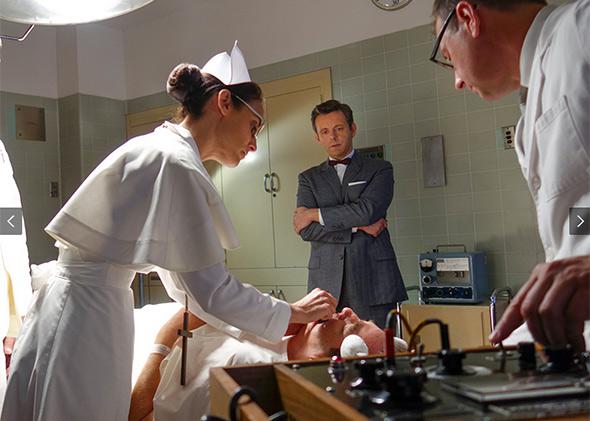Masters of Sex, Showtime’s handsome, cool period drama about the pioneering sex researchers William Masters and Virginia Johnson, focuses its second season on a case study: the sexual relationship of Masters (Michael Sheen) and Johnson (Lizzy Caplan). As the new season begins, it’s the late 1950s, the storied sex study is on hold, Masters has been fired from his job, and the lone researchers supplying data are Masters and Johnson themselves, posing as a married couple in a hotel room night after night. Masters of Sex, like its protagonists, takes as its main subject questions of sex and love. But where their study is focused, or so they say, on the cold, hard science of copulations, Masters of Sex is focused on the hot, messy psychology of intimacy.
Last season, Masters of Sex introduced Masters and Johnson as the kind of superego and id of sexual research. Masters was inexperienced, uptight, repressed, credentialed, and alight to learn about the biology of sex, in a way only a person who desperately wanted to learn about sex for more personal reasons could be. Johnson was worldly, warm, experienced, and alight to teach people about sex, in a way that only someone who desperately longed to feel masterful could be. The two made a great, dedicated team, so great and dedicated that they began fornicating themselves— for the study, of course.
Ah, that study: Never has dryly observed science set so many libidos racing. The study is both the whole point and a sort of shibboleth for Masters and Johnson, a piece of work that will truly change the world and also the cover and turn-on they use to engage in their increasingly complicated psychosexual dynamic. At the end of last season, Masters, having paid Johnson off like a whore, showed up at her door, soaked to the skin, and told her he needed her, inaugurating their first probe- and sensor-free act of sexual congress. But this did not turn Masters into Lloyd Dobler. In the new season, the two return again and again to the hotel, but not, he insists, because they are having an affair. “I’m a happily married man,” Masters claims, like the God Emperor of denial, while suggesting they carry on for the sake of science anyway.
Johnson acquiesces to this, an arrangement that gives the new season a flavor of mystery—why, exactly, is she agreeing? On a superficial level, Johnson’s attraction to Masters seems inexplicable: She’s a sexy, accomplished, competent woman, and he has trouble with the most basic human connection. But Johnson thrills to Masters’ essential inviolability, to his self-contained power, to his so-rarely-given respect. Masters’ admiration, his acknowledgement, his faith in Johnson are supremely attractive to her. As Masters and Johnson would be the first to tell you, you never know what will turn someone on.
As played by Lizzy Caplan, Johnson seems slightly overmannered to me: Even when she’s alone, she has the look of someone who feels like she is being watched. It’s such a perpetual affectation, it must be on purpose: Masters and Johnson are both constantly aware of the expectations of others, but only Johnson, a woman working in a hospital where men feel free to threateningly solicit her every day, has to contemplate pleasing them. As Masters, Sheen is not playing an anti-hero, but someone much more difficult to like—an anti-charismatic. His Masters is willfully repressed and aggressively passive: He is withholding and cold as a means of besting other people, of outsuffering them.
There’s a long-standing TV trope wherein the hero of a show excels at helping people with exactly that which he cannot help himself: the fixer who cannot fix herself (Scandal, Ray Donovan), the doctor who cannot heal himself (House, Grey’s Anatomy). Masters is the sex expert who can’t connect. As a doctor and a thinker, he is aces. The show takes on a kind of a case-of-the-week structure through the first three episodes, and Masters is heroic in them, fiercely protecting a woman from a forced hysterectomy, trying to keep an infant from premature sexual reassignment surgery. With Johnson, with his patients, we see his kindness, his fragility, his weakness. But with his family, we see only his cruelty. At home, his wife, Libby (Caitlin Fitzgerald), has had a baby, whom Masters refuses to touch. When his son cries, Masters literally turns up the music, trying to drown him out.
Watching Masters and Johnson’s twisted romance blossom feels a little like reading one of Freud’s case studies. We believe that when the patient histories have been collected, the traumas listed, the personalities fully expounded, there will be some logic at play, some explicable fount for both of their urges and desires. For a show about sex and attraction, Masters of Sex is very cerebral, measured, distanced. But so are its characters, who use their intellects to protect their vulnerabilities. At the end of the third episode, after pulling a hotel room all-nighter in which they have revealed their troubled histories to one another, Masters asks Johnson how she will note it for the study. “Two sexual acts, one masturbatory act, and role-playing throughout,” she replies, an answer as technically accurate as it is emotionally incomprehensive. He nods. It would be so much simpler if the science told the whole story.
